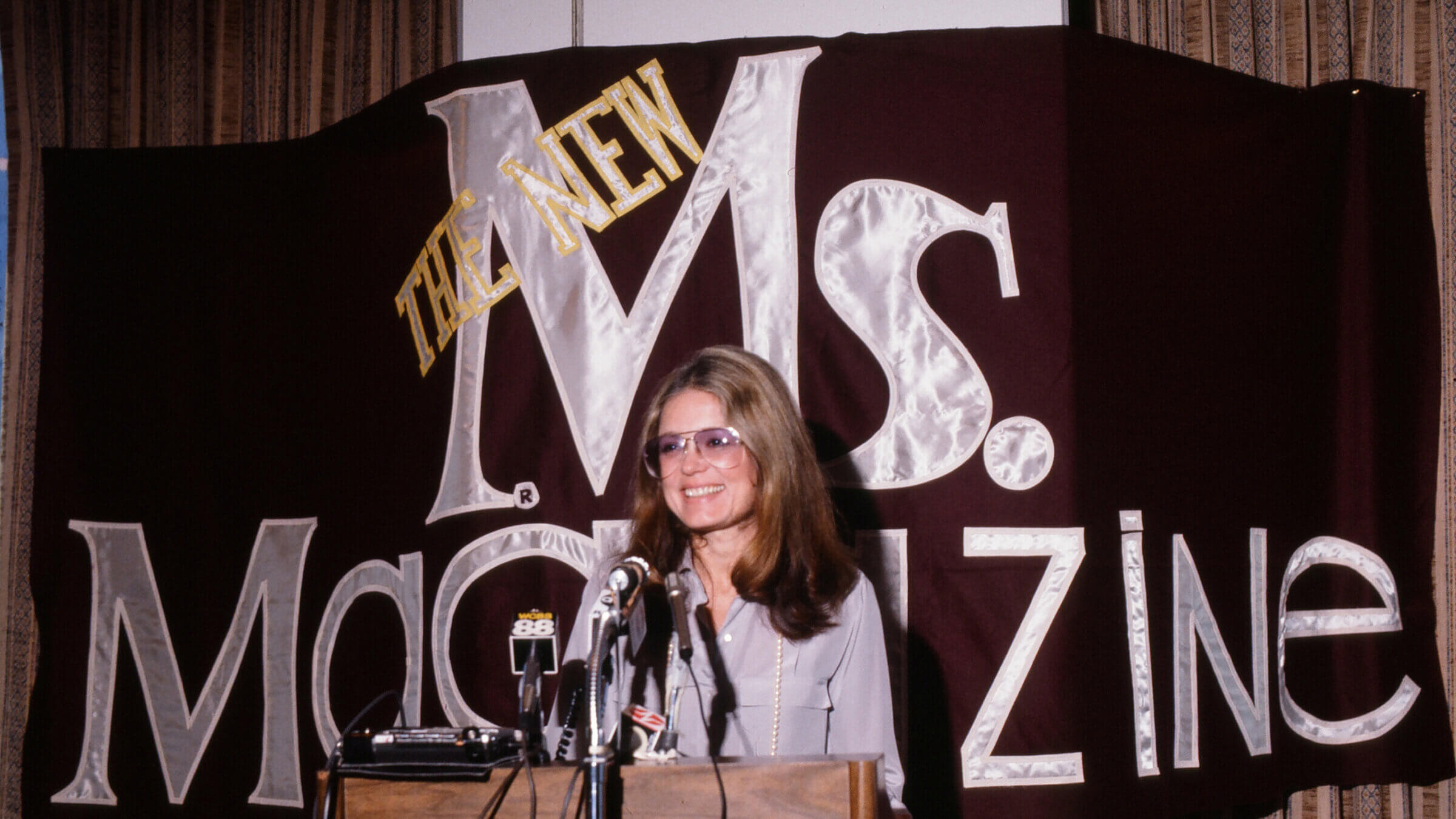Can ‘Ms.’ magazine catch a new wave of feminism?
A new documentary on the groundbreaking magazine sheds light on its history, and couldn’t be more of the moment.

Gloria Steinem at a press conference about ‘Ms.’ magazine. Photo by Robert R. McElroy/Getty Images
Even before it published its first issue in 1971, Ms., the feminist magazine co-founded by Gloria Steinem, had vocal critics. Journalist Harry Reasoner declared on ABC News that the publication would barely last five months. However, within three days of their distribution, Ms, sold out its first 300,000 test copies. Nearly 54 years later, the magazine is still in publication and its legacy is being explored in a new documentary from HBO.
Dear Ms.: A Revolution in Print, which had its world premiere at the Tribeca Film Festival, gives an honest appraisal of the impressive and ugly parts of the history of Ms., which took shape in the second wave of feminism. Created by Jewish journalists like Steinem and founding editor Letty Cottin Pogrebin, it was the first publication to give women the space to publicly discuss their sexuality, domestic violence, and dreams beyond homemaking.
Divided into three parts, each with a different director, the film takes viewers behind the stories of some of Ms.’ most impactful stories through interviews with writers and editors like Steinem, Pogrebin, Patricia Carbine, and Lindsy Van Gelder. The directors — a more diverse array of women than the founding editors of Ms. — capture the complexity of making a magazine to serve a diverse demographic of women readers.

In part one, Salima Koroma, an Emmy winner for Dreamland, her film about the Tulsa Race Massacre, interviews Black writers like Michele Wallace and Marcia Gillespie, who believed Ms.‘s early issues failed to address Black women’s experiences. Although Ms. always attempted to bring diverse perspectives into the news room by hiring Black talent, they sometimes missed the mark. Gillespie points out that while white women complained about wanting to leave the house and enter the workforce, Black women rarely had the option to stay home with their kids. Most Black women had to take up menial labor positions, occasionally as caretakers for white homes.
One of the most notable contributing Black writers and editors was Alice Walker, who was also on the cover in 1982, a year before she published The Color Purple.Gillespie, who was the editor-in-chief of Essence from 1971 to 1980, describes having been “pissed off” when Ms. published Walker’s “In Search of Our Mother’s Garden,” a piece she felt belonged in a Black magazine.
However, she acknowledged, Ms. had a wider reach than Essence did at the time and made the general public more aware of Black female writers. Ironically, Walker would later leave Ms., citing a frustration with the lack of diversity and Gillespie would join the magazine as a writer. In 1992, Gillespie became Ms.’s editor-in-chief, the first Black woman in the U.S. to serve that role at a mainstream publication.
Ms. was also forced to reconsider the scope of the feminist perspectives they represented when the anti-porn movement began to take off in the 1980s, the focus of part three, directed by Cecilia Aldarondo (2020’s Landfall). Many writers for Ms. wanted to condemn the casual violence depicted against women in the media and in pornography in particular.
Activist Andrea Dworkin, a founder of the anti-pornagraphy movement, wrote for Ms. at the time and condemned it in her articles. While a number of feminists agreed with Dworkin, there were some concerned about how the sentiment echoed positions taken by the Reagan administration and conservatives as part of their moral wars. Sex workers like Annie Sprinkle and Candida Royalle, who saw their jobs as empowering, also took issue that Ms. did not make room for their perspective.
In 1985, Ms. published the cover story “Is One Women’s Sexuality Another Women’s Pornography?,” which broadened how the magazine addressed adult entertainment. Dworkin ended up breaking off from the magazine in response.
By this time, writers and editors at Ms. had already experienced fallout from controversial choices. Their decision to have an issue dedicated to male feminists resulted in backlash from women who believed men had no place in its pages. Putting Black women on their covers lost them distribution in parts of the South in the 1970s.
In 1976 and 1977, when they published issues on domestic violence and sexual harassment, which are central to the second part of the film, directed by Alice Gu, advertisers withdrew from their pages, not wanting their ads alongside images of battered women and mannequins reenacting sexual molestation. But the editors knew the importance of platforming women’s struggles outweighed the cost of advertisement loss. Three years after the 1977 issue on sexual harassment was released, the Equal Employment Opportunity Commission created guidelines categorizing sexual harassment as a form of sex discrimination under Title VII of the Civil Rights Act.
The staff at Ms. also dealt with the ire of those who disagreed with feminism, which included both men and women. They often got letters from men blaming the magazine for ruining their marriages, lamenting that their wives no longer wanted to be homemakers. One woman wrote that her “liberal” husband worries Ms. was radicalizing her and had to cancel her subscription to save her relationship.
The issues that Ms. dealt with in the ‘70s and ‘80s have never fully gone away — the #MeToo movement in 2017 furthered public discourse about sexual harassment; trad wife content has surged in popularity on social media; conservative values towards gender and sex are becoming more present in legislation. Dear Ms. is coming at a perfect time to remind a new wave of feminists about the importance of speaking out and share that while it’s not an easy road, it results in real change.
Dear Ms.: A Revolution in Print is currently showing in New York as part of the Tribeca Film Festival.
















